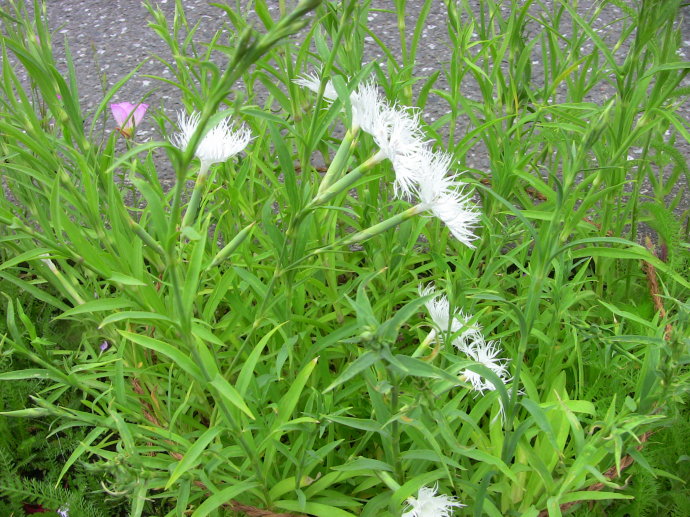Spicy scented flowers with notched petals are the characteristic of many flowering plants in genus Dianthus. Dianthus superbus and Dianthus chinensis, also known as Qu Mai in mandarin, are no exception. They can emit a hauntingly sweet fragrance that can be smelled at a distance of a few hundred feet. This distinct scent can make people feel comfortable and relaxed. No wonder the ancient Greeks called dianthus plants as "the flower of God". It is said that Linnaeus, the famous Taxonomist, favored dianthus superbus so much that he gave it a name like this. As a Chinese herb Dianthus superbus and D. chinensis have long been used for a full spectrum of health concerns, in particular urinary system problems. In addition, it treats Amenorrhea, Esophageal Cancer, stomach cancer, Colon Cancer, and more.
It is noteworthy to note that Dianthus refers not to a single plant but a genus in the family Caryophyllaceae, in which there are approximate 300 species distributed in Asia, Europe, Africa, and arctic North America. And the most commonly seen Dianthus varieties are Dianthus caryophyllus, D. barbatus, D. plumarius, and so on. However, in traditional Chinese medicine Qu Mai, also known as Herba Dianthi in Latin name, mainly refers to the dried aerial part of D. superbus and D. chinensis. In China it is mainly produced in Hebei, Henan, Liaoning, and Jiangsu. It is usually harvested in summer and autumn during flowering and fruiting time. After that, it needs to remove impurities, dry them in the sun, and cut them into sections. It is generally used raw medicinally.

Dianthus
DIANTHUS HEALTH BENEFITS
(1) Diuretic effects. Its decoction has obvious diuretic effect to rabbits, anesthetized dogs, and dogs without anesthesia. It has greater impact on potassium excretion than sodium excretion. It contains 500mg/100ml, which is believed to be relevant to diuresis and the high potassium levels;
(2) Cardiovascular effects. It has a strong inhibitory effect on isolated frog heart and rabbit heart. And its decoction of the ears has hypotensive effect in anesthetized dogs, which is believed to be caused by cardiac depression;
(3) Intestinal effects. Experiments show that its decoction has obvious excitatory effect on animal intestine. It could lead to rising intestinal tension in isolated rabbit intestine. And it could still increase the intestinal motility of anesthetized dogs and dogs with chronic intestinal fistula but it has no significant effect on the tension. And diphenhydramine and papaverine can antagonize this effect;
(4) Uterus effects. Its ethanol extracts have obvious excitatory effect on anesthetized rabbit's uterus and the isolated y uterine muscle of the rat. It can result in obvious uterine contractions, increased frequency, and enhanced tension in anesthetized rabbit's uterus. The role of exciting uterine muscle strengthens with the increasing dose, which represents as increasing frequency, more lasting rhythmic contraction, and tonic contraction in few uterine muscles. And the combination with prostaglandin E2 can produce synergies, which account for 70%;
(5) Bacteriostatic action. Eugenol contained can inhibit pathogenic fungi, Staphylococcus aureus, Klebsiella pneumoniae, Escherichia coli, Proteus vulgaris, Mycobacterium tuberculosis, and so on;
(6) Other effects. It has been reported that its 10% decoction in vitro can kill schistosome parasites in 8 to 12 minutes. In the case of its 100% decoction was used for schistosome infected rabbits, it failed to reduce deaths. But compared with the control group, it can reduce the rate of remaining schistosome infection, slow the weight loss, and improve liver changes. However, other reports told that in vitro it couldn't kill schistosomes and in vivo tests it failed to kill adult Schistosoma and reduce mortality in mice infected with Schistosoma.

![Diseases, Symptoms, tcm, [tcmwindow.com]](/uploadFile/adImg/2015/11/11/f5cbfcc0-4df5-4646-9b9a-f316651a0199.jpg)





